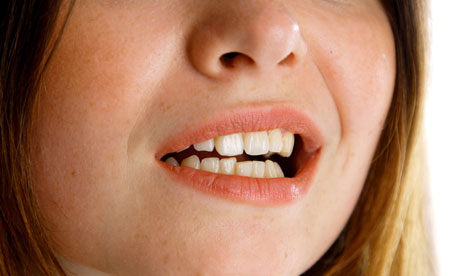
Teeth grinding (the medical term is bruxism) is not only annoying but fairly common. It's a condition in which you grind or gnash your teeth, especially in your sleep. It may not cause any problems but can give you headaches, a sore face (from clenching facial muscles all night) and jaw pain. Persistent teeth grinding may damage the joints in the jaw, which will make it painful to yawn or chew.
No one knows what causes teeth-grinding. Children do it more often than adults, possibly because their baby teeth are smoother and more amenable to grinding. It is common if you are stressed or anxious. Occasionally it can be due to your upper and lower teeth not being aligned properly or because of medications, including some antidepressants.
There is no magic cure, but mouthguards are often recommended to protect the teeth at night. Think sports guard for when you're playing rugby or hockey and you'll get the look. But do they work or is there anything just as effective but less intrusive?
The solution
"Mouthguards work well but they are best fitted professionally," says Damien Walmsley, scientific adviser to the British Dental Association. "You should see your dentist, who will take an impression and usually fit one on the top teeth. They're plastic and can be soft, although people can chew through them, in which case they'll need a harder guard. If you get one from the chemist and mould it yourself it won't fit well enough."
They work by separating the teeth and preventing grinding. You can then see if you're still grinding by checking the wear and tear on the guard. They can take some time to get used to but but they stop your face and jaw aching and reduce the likelihood of you breaking your teeth. You only have to wear the guard at night but you may need to continually use it if your grinding has become an intractable habit.
If you don't fancy a mouthguard and suspect stress is making you grind your teeth, you can try relaxation techniques and meditation. You should rest your tongue upwards, with your teeth apart and lips closed, which reduces the tendency to stiffen your jaw and grind. Children who do it can be helped by getting them to relax before they go to sleep with a bath and story.
It's worth going to the dentist if you grind your teeth, not only for a fitted guard but to check your teeth are not misaligned. Sometimes reshaping the surface of teeth will help. But if it's an ongoing problem, forget the cosmetic drawbacks and get yourself a mouthguard.

